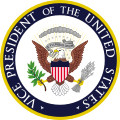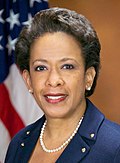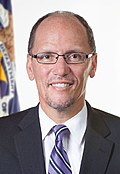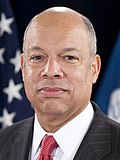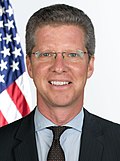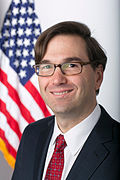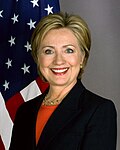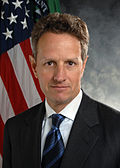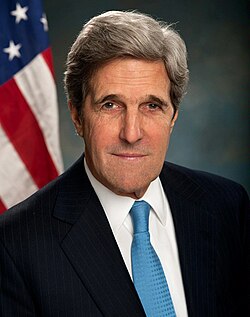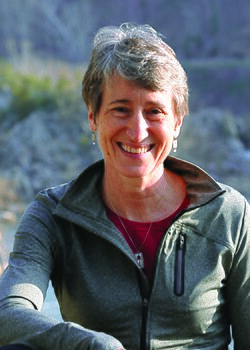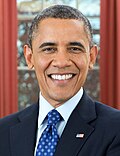Obama Cabinet | |
|---|---|
| Cabinet of the United States | |
| 2009–2017 | |
 First Cabinet of President Barack Obama in the White House East Room, 2009 | |
| Date formed | January 20, 2009 |
| Date dissolved | January 20, 2017 |
| People and organizations | |
| President | Barack Obama |
| President's history | U.S. Senator from Illinois (2005–2008) Illinois State Senator (1997–2004) |
| Vice President | Joe Biden |
| Member party | Democratic Party |
| Status in legislature | Majority government (2009–2011) Divided government (2011–2017) |
| Opposition party | Republican Party |
| History | |
| Elections | 2008 presidential election 2012 presidential election |
| Legislature terms | 111th Congress 112th Congress 113th Congress 114th Congress 115th Congress (17 days) |
| Budgets | 2009 budget 2010 budget 2011 budget 2012 budget 2013 budget 2014 budget 2015 budget 2016 budget |
| Advice and consent | United States Senate |
| Predecessor | G.W. Bush Cabinet |
| Successor | First Trump Cabinet |
| ||
|---|---|---|
Personal
Illinois State Senator and U.S. Senator from Illinois 44th President of the United States
Tenure
Appointments  | ||
Barack Obama assumed office as the 44th president of the United States on January 20, 2009, and his term ended on January 20, 2017. The president has the authority to nominate members of his Cabinet to the United States Senate for confirmation under the Appointments Clause of the United States Constitution.
Contents
- Cabinet
- Cabinet officials on January 20, 2017
- Cabinet-level officials
- Confirmation process
- Elected officials
- President
- Vice President
- Nominated candidates for Cabinet positions
- Secretary of State
- Secretary of the Treasury
- Secretary of Defense
- Attorney General
- Secretary of the Interior
- Secretary of Agriculture
- Secretary of Commerce
- Secretary of Labor
- Secretary of Health and Human Services
- Secretary of Housing and Urban Development
- Secretary of Transportation
- Secretary of Energy
- Secretary of Education
- Secretary of Veterans Affairs
- Secretary of Homeland Security
- Nominated candidates for Cabinet-level positions
- Chief of Staff
- Director of the Office of the Budget
- Ambassador to the United Nations
- Administrator of the Environmental Protection Agency
- Trade Representative
- Chair of the Council of Economic Advisers
- Administrator of the Small Business Administration
- Formerly Cabinet-level
- Director of the Office of National Drug Control Policy
- See also
- Notes
- References
- External links
Before confirmation and during congressional hearings a high-level career member of an executive department heads this pre-confirmed cabinet on an acting basis. The Cabinet's creation was part of the transition of power following the 2008 presidential election.
This article documents the nomination and confirmation process for any successful or unsuccessful Cabinet nominees of the Obama administration. They are listed in order of creation of the Cabinet position (also used as the basis for the United States presidential line of succession).


